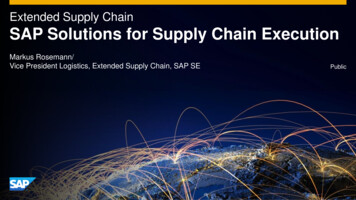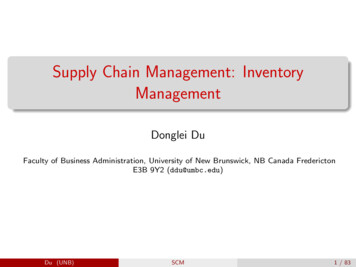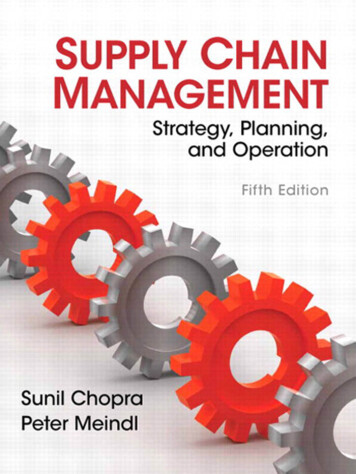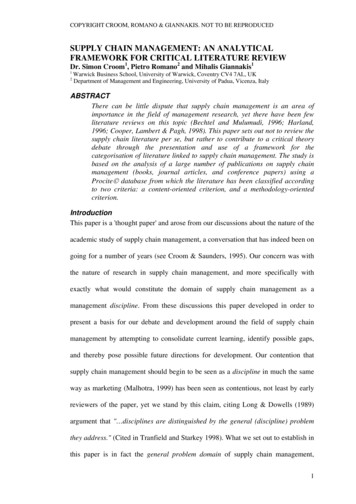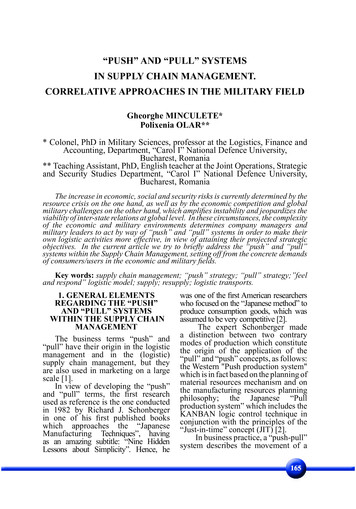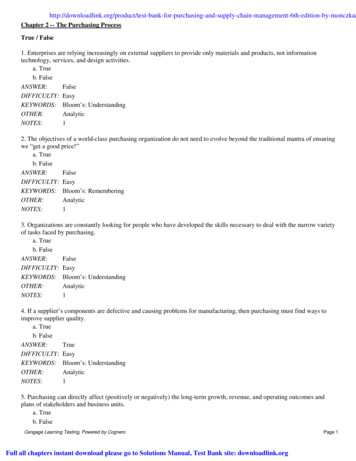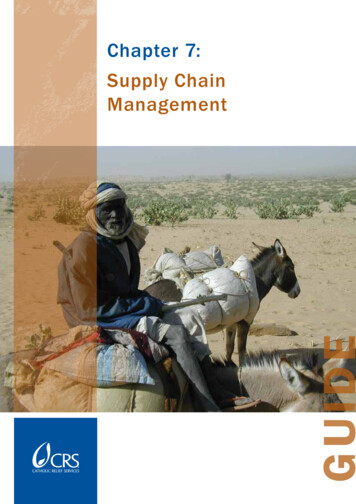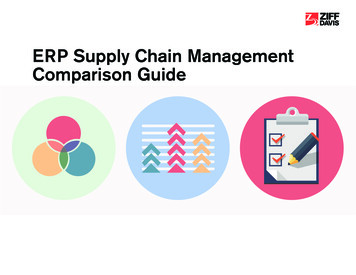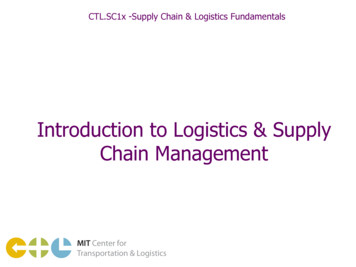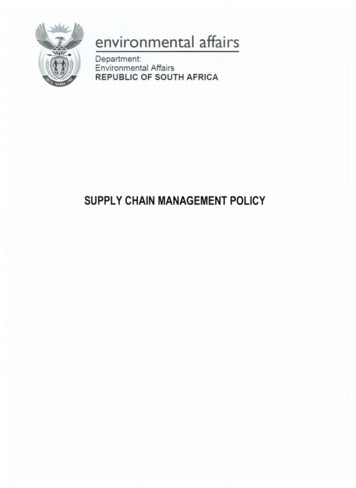
Transcription
environmental affairsDepartment:Environmental AffairsREPUBLIC OF SOUTH AFRICASUPPLY CHAIN MANAGEMENT POLICY
INDEX TO SCM y43Introduction74Elements of SCM85.15.15.35.45.55.6Demand ManagementAcquisition ManagementLogistics ManagementDisposal ManagementSupply Chain PerformanceRisk Management9-126Separation of duties137SCM Policy Objectives138General conditions for procurement of goods and services149Black Economic Empowerment (BEE)1710Responsibilities1811Values and code of conduct12Bid Administration2013Policy on Acquisition of goods and services by price2118-19quotations14Accommodation and Conferences15Bid Evaluation method16Exceptions to the bidding process2417Accepting a Bid2418Appointment of consultants19Consultant Bid Evaluation2620Establishing of a list of prospective Service Providers2721Declarations of interest by the bidder (see attached annexure 5272121-2325-26and 6)2
PAGEPARAGRAPHCONTENTNONO1.22Late Bids2723Payment of Supplier's accounts2824Deviations from normal policies and irementsSection 217 of the Constitution of the Republic of South Africa, 1996 (Act No. 108 of1996). requires an organ of state to contract for goods or services in accordance with asystem that is: FairEquitableTransparentCompetitive, andCost effective.NATIONAL LEGISLATION PRESCRIPTS AND GUIDES ON WHICH POLICY IS BASEDLegislation that This procurement policy is in support of the following legislation, regulations andunderpins SCM guidelines: The Public Finance Management Act, 1999 (Act No. 1 of 1999) (PFMA]Treasury Regulations: SCM Chapter 16AThe Framework for Supply Chain Management dated December 2003, issued byNational TreasuryNational Treasury's Supply Chain Management Guide for Accounting Authorities,dated February 2004The Policy Strategy to guide uniformity in Procurement Reform Process inGovernment, dated July 2003The Broad-Based Black Economic Empowerment Act, (Act No. 53 of 2003), andits codes of good practice as promulgated on 9 February 2007The Preferential Procurement Policy Framework Act, 2000 (Act No. 5 of 2000)Promotion of Access to Information Act, 2000 (Act No. 2 of 2000) ' Director-Genera l3
This purpose of The purpose of this policy on Supply Chain Management (SCM) is to give effect to thefive pillars of procurement, i.e. it must be fair, equitable, transparent, competitive andthis policycost effective, as well as to give effect to the enabling legislation, regulations andstrategies to modernise procurement, provisioning and related functions.2.GLOSSARYIntroductionThe following terms and explanations apply in this policy:TermAcceptable bidExplanationAny bid that complies in all respects with the specification andcond itions set out in the procurement documentDEABBBEE ActDepartment of Environmental AffairsBroad Based Black Economic Empowerment Act, 2003 (ActNo. 53 of 2003)Bid (or tender)A written offer in a prescribed form in response to aninvitation by the Department of Environmental Affairs for theprovision of services, works or goodsDepartmental Adjudicationcommittee (DAC)The Departmental Adjudication Committee that is responsiblefor adjudicating the award of bidsBid evaluation committeeCommittees approved by the respective DOGs that areresponsible for assessing bids with a view to submitting arecommendation or evaluation report to the DepartmentalAdjudicating Committees for the award of the contract to thepreferred bidderGoods and servicesGoods to be included in goods and services (petrol, coal,small tools and equipment, stationery, foodstuff andelectricity, services will include hotels, restaurant, transport,communication , banking, business services, consultants'fees, market research and staff training, as well as rental ofbuildings, other fixed structures, equipment and vehicles .Payments for research , design costs, bursaries togovernment employees and consultants' fees are alsoconsidered purchases of services and as such are classifiedunder goods and services. \ . :'\1'-"ll)Di rector-Genera l4
TermHOIExplanationA "Historically Disadvantaged Individual" is a South Africancitizen who:1.Because of the apartheid policy that was in place,had no franchise in national elections prior to theintroduction of the Constitution of the Republic ofSouth Africa ,1983, or the Constitution of the Republicof South Africa,1993, and/ or2.Is a female, and/ or3.Has a disability- ,provided that a person who obtained South African citizenshipon or after the coming into effect of the Interim Constitution , isdeemed not to be an HOI.Organ of State 00Any department of state or administration in the national,provincial or local sphere of government, orAny other functionary or institution exercising a:power or performing a function in terms of theConstitution or a provincial institution , orpublic power or performing a public function in terms ofany legislation, but does not include a court or a judicialofficer.PFMAThe Public Finance Management Act, 1999 (Act No. 1 of1999), as amended by Act No. 29 of 1999PPPFAThe Preferential Procurement Policy Framework Act, 2000(Act No. 5 of 2000), which regulates preference points toHDisBid documentsThe bid documents are all SBD forms and TORs to bedistributed to prospective bidders during the Department ofEnvironmental Affairs' solicitation of bids from bidders. Thesedocuments contain the information required for bidders tosubmit their bids to the DepartmentBidder to submit all documents and information as per thecriteriaAre where early delivery is of critical importance and theinvitation of competitive bids is either impossible orimpracticalAre where immediate action is necessary in order to avoid adangerous or risky situation.Regulations in terms of the Public Finance Management Act,1999: Framework for Supply Chain Management(Government Gazette Number 25767 of 5 December 2003)SubstantialUrgent casesEmergency casesSCM regu lationsC. l1 Y .'.':'. .':: u .-:--:.D irector-Genera I5
TermSCM unitExplanationThe Department of Environmental Affairs' Supply ChainManagement unit that falls under the auspices of the ChiefFinancial Officer (CFO), as per Treasury Regulation 16A4Scoring modelsThe models used to evaluate bids. Scoring models apply theevaluation criteria identified in the Procurement Documents tocompeting bidsSupplier registerThe Department's database of suppliersTreasuryNational TreasuryAccounting OfficerDOGThe head of the Department of Environmental AffairsDeputy Director-GeneralCFOChief Financial OfficercooChief Operating OfficerDirector-General6
3.INTRODUCTIONWhat is SCM?Supply Chain Management is an integrated part of financial management, intended tointroduce international best practices.DefinitionSCM is a collaborative strategy to integrate procurement and provisioning processesso as to eliminate non-value added cost, infrastructure, time and activities in a waythat will serve end users better and more competitively.Key aspects include integrated planning of operations, tactics and strategies.Director-Genera l7
4. ELEMENTS OF SCMSCM comprises the following elements:1.Demand managementThis is the beginning of the supply chain where: A need assessment to ensure that goods or services are acquired inorder to deliver the agreed service is done; Specifications are precisely determined ; Requirements are linked to the budget; and The supplying industries have been analysed .2.Acquisition management (procurement)This is almost all the focus of procurement activities including: 3.Which market will be approached;Establishing the total cost of ownership of a particular type of asset;Ensuring complete bid documentation including evaluation criteria ;Evaluating bids in accordance with published criteria; andEnsuring that proper contract documents are signed.Logistics managementThis aspect addresses the following : 4.Setting of inventory levels.Receiving and distribution of materials.Stores, warehouse and transport management. andReview of vendor performance.Disposal managementAt this stage consideration should be given to: Obsolescence planning;Maintaining a database of redundant material;Inspecting material for re-use ;Determining a disposal strategy; andExecuting the physical disposal process.Director-General8
5.Supply chain performanceThis is the monitoring process, undertaking a retrospective analysis todetermine whether proper processes have been followed and whether thedesired objectives were achieved.6.Risk managementRisk in the case of SCM will include ensuring on a case by case basis thatrisks such as price or currency fluctuations are allocated to the appropriateparty in unambiguous contract documents or that guarantees or insurancearrangements are in place.Each is discussed in greater detail below.5.1 DEMANDMANAGEMENTThis is the beginning of the supply chain where the following happens:Stage1234. EntityresponsibilityBranchManagementSCM UnitBranch MgtSCM UnitBranchMgt/FinanceSCM UnitBranch MgtSCM UnitAction responsibility/DutyPerforms a needs assessment to ensure that goodsor services are acquired in order to deliver agreedservicesDetermines specifications preciselyLinks requirements to ensure that funds areavailableAnalyses the supplying industryThe outcome from this stage is that value for money is achieved .Director-General9
5.2 ACQUISITIONMANAGEMENTThe acquisitioning management (or procurement) process includes the following :1EntityresponsibilityBranch Mgtassisted by SCMUnit2SCM UnitEstablishes the total cost of ownership of aparticular type of asset (life cycle costing)3SCM UnitEnsures that bid documentation (includingevaluation criteria) is completed4Bid EvaluationCommitteeEvaluates bids in accordance with publishedcriteria.5BranchManagementassisted by Lega lServicesEnsures that proper contract documentation issigned.StageAction responsibility/DutyDecides on how the market will be approachedThe outcome from this stage is that value for money is achieved.Director-General10
5.3 LOGISTICSMANAGEMENTLogistics management includes the following:1EntityresponsibilitySCM UnitSets inventory levels2SCM UnitReceives and distributes material3SCM Unit4SCM UnitManages stores, warehouse , issuing of orders andtransportReviews vendor performance5Finance DivisionActivates the fi nancial system to generate paymentsStage5.4 DISPOSALMANAGEMENTAction responsibility/DutyThe following happens during th is stage:Stage1Entity responsibilitySCM UnitDisposal CommitteeAction responsibility/DutyCarries out obsolescence planning2SCM UnitDisposal CommitteeMaintains a database of redundant material3SCM Unit Analyses potential for re-use of material;Determines a disposal strategy;Executes the physical disposal process;andUpdates the asset registerDirector-General11
5.5 SUPPLYCHAINPERFORMANCEHere a monitoring process and an undertaking of a retrospective analysis takes placeto determine whether the proper process is being followed and whether the desiredobjectives are achieved.Stage1Entity resl! onsibil!!}tBranch MgtSCM UnitFinance DivisionAction res p onsibilit}'/Du!YAssesses: Achievement of goals; Compliance with norms and standards; and Savings generated2SCM UnitAssesses: Stores efficiency; and Cost variance per item and contract breach,etc.3SCM UnitCalculates cost efficiency of the procurementprocess (i.e. the cost of the process itsel04SCM Unit assisted byBranch Mgt 5.6 RISKMANAGEMENTDetermines whether supply chainobjectives are consistent with theGovernment's policy focusDetermines whether the principles ofcorporate governance as expounded in theConstitution are observedDetermines whether the reduction ofr ional economic di arities is gromotedRisk management forms an integral part of the SCM process. This stage considersthe following :Stage1Entityresponsibili!YRisk ManagementAction responsibility/Duty Identifies procurement riskChannels risk where it is best placed andmitigatedExercises risk management in a proactivemannerClearly stipulates in contract documentationto whom the risk is allocatedDirector-General12
6.SEPARATION OF DUTIESIn order to provide a clear distinction between the SCM recommendation and theapproval functions, the following institutional arrangements shall be implemented :Policy 7.No official in the Department of Environmental Affairs shall execute any power interms of delegated authority if he/ she was a member of a committee whichrecommended the execution of such a power.If an official is a member of an evaluation committee where a recommendation ismade, that official is not allowed to be part of the Departmental AdjudicationCommittee.SCM POLICY OBJECTIVESThe primary objective of th is policy is to create an environment that enables theDepartment to procure goods, services and works in a manner that is fair, equitable,transparent, competitive and cost effective.Inherent in this objective are the principles of good corporate governance (through acode of conduct) , and the promotion of socio-economic objectives that require adisciplined management approach to procurement.Scope of thepolicyThis policy provides a uniform approach to all procurement processes that will resu lt ina contract between the Department and bidders and is applicable to: Pre-determinedneedConsulting services (professionals and other consultants) ; andGeneral goods and services (provisioning).Within the context of SCM, the following are triggered by a pre-determined need:1.2.3.4.Demand Management;Acquisition Management (Procurement);Logistic Management; andDisposal Management (sale of assets)Director-Genera l13
8.GENERAL CONDITIONS FOR PROCUREMENT OF GOODS AND SERVICESThe following general conditions shall apply to the SCM process:LocalmanufactureIn the adjudication of bids, the Department of Environmental Affairs shall giveparticular consideration to procuring locally manufactured products. Preferences inthis regard may be accommo
SCM is a collaborative strategy to integrate procurement and provisioning processes so as to eliminate non-value added cost, infrastructure, time and activities in a way that will serve end users better and more competitively. Key aspects include integrated planning of operations, tactics and strategies.
